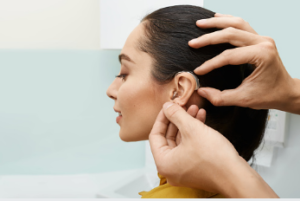The hearing aids clinic Adelaide takes a patient-centric approach. An audiologist will work with you to select the appropriate technology for your needs, lifestyle and budget.
 Many styles of hearing aids are available, including invisible and completely-in-the-canal options. Models range from basic to premium and offer wireless features like streaming audio or customisable switches.
Many styles of hearing aids are available, including invisible and completely-in-the-canal options. Models range from basic to premium and offer wireless features like streaming audio or customisable switches.
Cost
If you’re considering investing in hearing aids but are worried about the price tag, speaking with your healthcare provider is wise. They can estimate how much these services will cost and whether or not they can assist with managing your financial obligations.
Although hearing aids can be expensive, they also provide many advantages and improvements to your life. For instance, they help you better comprehend speech in noisy places, make conversation easier to follow, and even enhance music enjoyment.
However, the cost of a hearing aid can vary significantly based on your requirements and budget. Some people may have insurance that covers hearing aids, while others must pay out-of-pocket for their devices.
If you’re uncertain of the benefits of wearing a hearing aid, take advantage of a risk-free trial period. Many hearing aids clinic Adelaide offering hearing aids will allow you to try one for one week to see how well it works for you.
Once you know which hearing aid type you require, an audiologist can assist in selecting one that meets both your budget and lifestyle requirements. They’ll also explain the various warranty and aftercare plans available – such as cleanings, adjustments and warranties – for added peace of mind.
When purchasing hearing aids, it’s important to consider how many ears need assistance. Two devices will likely be necessary if both ears have moderate to severe hearing loss.
In some cases, hearing aids clinic Adelaide offers financing or payment plans that break the cost of a hearing aid into manageable monthly payments. These arrangements can be especially helpful for those without health insurance or with limited funds available.
Appointments
Investing in hearing aids is a significant decision, so finding the one best suited to your communication needs is essential. An audiologist can assess which hearing aids to suit you and help select the style, brand and technology that meets your requirements.
Once your hearing aids arrive, scheduling appointments for a hearing assessment, fitting, and follow-up care is important. It guarantees the devices are correctly programmed and fitted according to your communication requirements.
The committee determined that the initial appointment should be a face-to-face consultation to review and discuss the results of your hearing assessment with you and address any specific difficulties or worries you may have. Following this appointment, 6 to 12 weeks after the initial fitting, there should be another chance to test your new hearing aids and make any necessary adjustments or queries regarding them.
The committee noted that current practice varies across the country, and some services provide no follow-up appointments or only brief check-ups, which may not be adequate and could have detrimental effects on an individual’s hearing aids or quality of life in the long run. Therefore, they agreed that this should be taken into account, and a short amount of time dedicated to follow-up checks at fitting or shortly after should benefit those with hearing loss by reducing future additional audiology aftercare or GP appointments, decreasing cost and resource use for managing hearing loss management.
Tests
If you have hearing loss, an audiologist will test your hearing and suggest the appropriate hearing aid for your requirements. With the appropriate device, sounds become clearer while eliminating noises like ringing or tinnitus (a persistent buzzing in your ears).
Your audiologist may use a variety of tests to assess your hearing health. These assessments can determine whether you have conductive or sensorineural hearing loss and enable you to select the most appropriate hearing aid for your specific requirements.
This test is commonly employed to diagnose eardrum perforations, fluid buildup and other ear infections. Additionally, it measures the movement of your eardrum in response to air pressure changes.
